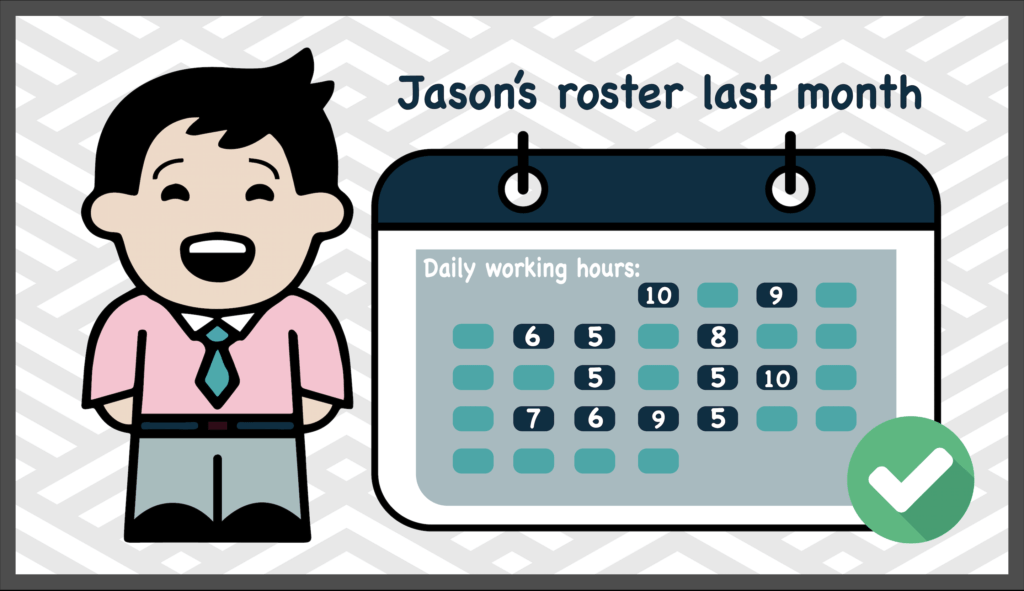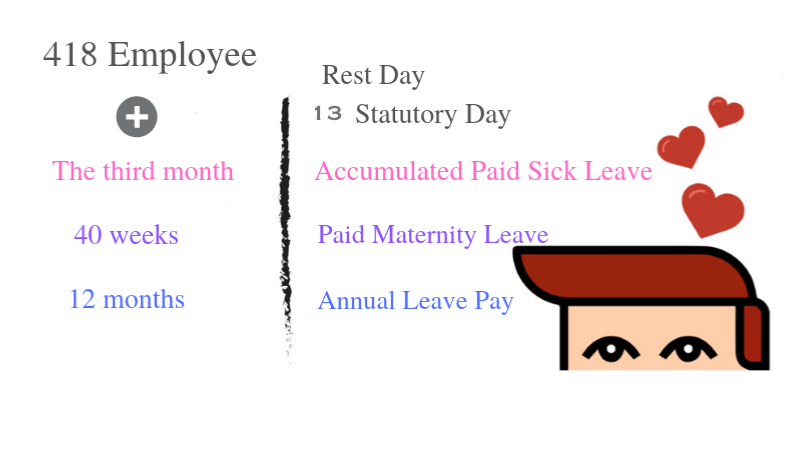Recently, the Labour Department is reviewing the Ordinance 418 under the Employment Ordinance, and has put forward four proposals for consulting both employers and employees. The total working hours to four weeks as a unit is planned, requiring employees to meet different working hours requirements within four weeks, namely 72, 68, 64 and 60 hours to enjoy more statutory employment benefits. Follow Workstem to learn more about Regulation 418!
What is Ordinance 418?
The “Continuous Contract”, commonly known as Ordinance 418, implemented since June 1990, states that an employee who is continuously employed by the same employer for four weeks or more and for at least 18 hours per week is regarded as being employed under a continuous contract, and is entitled to benefits such as statutory holidays, rest day, paid holiday, etc.
However, in 2023, the Labour Department has reviewed Ordinance 418, and plans to change it to 4 weeks of total working hours as the basis.
However, employees, no matter if they are full-time or part-time workers, who are employed under a continuous contract are entitled to benefits under Ordinance 418.

Here’s an example: Jason is a part-time worker who works 19, 19, 20 and 27 hours in the first to fourth weeks respectively, and works more than 18 hours in four consecutive weeks. Hence, he is a qualified 418 employee.
What entitlements are under Ordinance 418?
Employees who fulfill the requirements of continuous contract of employment are not only entitled to basic labour protection, but also additional statutory benefits such as paid sick leave.
Rest day
An employee employed under a continuous contract is entitled to not less than one rest day in every period of seven days. A rest day is defined as a continuous period of at least 24 hours.
Statutory holidays
- the first day of January
- Lunar New Year’s Day
- the second day of Lunar New Year
- the third day of Lunar New Year
- Ching Ming Festival
- Labour Day, being the first day of May
- The Birthday of the Buddha
- Tuen Ng Festival
- Hong Kong Special Administrative Region Establishment Day, being the first day of July
- the day following the Chinese Mid-Autumn Festival
- Chung Yeung Festival
- National Day, being the first day of October
- Chinese Winter Solstice Festival or Christmas Day
*If one of the first, second, and third days of the lunar year is a Sunday, the government will take the fourth day of the first lunar year as an alternative holiday; if the next day of the Mid-Autumn Festival is a Sunday, it will take Monday as an alternative holiday.
*If a statutory holiday falls on a rest day, the employee should be granted a holiday on the next day. For example, if the statutory holiday is Sunday, the employer will have to arrange an alternative holiday on Monday.
*If the employer requires the employee to work on a statutory holiday, the employer should arrange an alternative holiday within 60 days before or after the statutory holiday.
*If an employee has been employed under a continuous contract for not less than three months, he or she is entitled to holiday pay. The payment is calculated as the average daily wage of the employee for 12 months prior to the statutory holiday.

And they’re entitled to the additional benefits if they meet the certain conditions:
Paid sick leave
418 employees are entitled to accumulate two days of paid sick leave for each completed month of employment during the first 12 months, and 4 days for each completed month thereafter, not exceeding 120 days at any one time. If an employee can provide a medical certificate issued by a registered medical practitioner in Hong Kong for four days or more, the accumulated sick leave pay should be 80% of the average daily wage in the 12-month period preceding the first day of sickness.
For example, if an employee has not taken any sick leave in the first two months of his or her employment, he or she can take paid sick leave for four or more days with a medical certificate issued by a registered medical practitioner from the third month. If the employee’s daily salary is HK$600, the sickness allowance per day is calculated as: HK$600*80%=HK$480
Paid maternity leave
A female employee employed under a continuous contract for not less than 40 weeks are entitled to paid maternity leave for a period of 14 weeks. If the employer agrees, a pregnant employee may decide to commence her maternity leave two to four weeks before the expected date of confinement. The daily rate of maternity leave pay is a sum equivalent to four-fifths of the average daily wages earned by an employee in the 12-month period preceding the first day of maternity leave.
If a pregnant employee provides a medical certificate suggests that she cannot handle heavy, hazardous or harmful work, the employer shall remove her from that work within 14 days after receiving such request.
Annual Leave Pay
An employee is entitled to annual leave pay under continuous contract of more than 12 months. According to his or her length of service, the entitlement to paid annual leave increases progressively from seven days to a maximum of 14 days. An employee shall take the paid annual leave within the following period of 12 months. However, based on the contract, some companies’ annual holiday is calculated on the employee’s first day, other companies’ are calculated from January 1st to December 31st each year The daily payment of annual leave pay should be at least the average daily wages earned by an employee in the preceding 12-month period.
Do interns enjoy these rights?
For summer interns and part-time workers, when they meet the criteria for continuous contract, they can be entitled to the above benefits. According to the latest review by the Labour Department: employees are required to meet different working hours requirements within four weeks, which are 72, 68, 64 and 60 hours respectively.
Although many companies now treat interns with general employee, they still have the right not to give interns the protection of the “Employment Ordinance” and “Minimum Wage Ordinance”. For example, interns do not have rights such as paid holidays, MPF or minimum wage.
Some people believe that although interns should focus on learning instead of wage, the government should also specify employment rights for interns.
Things you should pay attention to as an employee!
If you are a part-time worker, remember that you are fully entitled to the employment benefits. It is important to read your contract carefully before entering the company and ask your employer about your wage and holiday details. If you have any questions, go and ask your employer to safeguard your employment rights.
Things you should pay attention to as an employer!
As an employer, it should also be noted that the MPF is not related to nor have any conflicts with Ordinance 418. The employer is required to make regular mandatory contributions to an MPF scheme even for non-418 employees.
As long as an employee is employed by the same employer for more than 60 days, the employer will have to arrange an MPF scheme for them without considering their working hours.
We strongly recommend to employees who are employed under any employment type, whether full-time, part-time, or summer intern discuss and confirm all the relevant regulations with their employers before joining the company. Employers and employees themselves should understand the Labour Department’s regulations and guidelines so as to guarantee the rights and interests of both parties.
Great recommendation! Workstem improves payroll efficiency.
Workstem one-stop human resources management system Support automatic obtain the number of remaining annual leave days when an employee resigns, customize the calculation method of annual leave pay, ADW calculation, settlement time, etc., and use the powerful AI calculation engine to calculate according to the annual leave pay calculation formula, and automatically compare salary data , ensure that the calculation of annual leave pay complies with company policies and standards, and pays out efficiently.
In addition to calculating annual leave pay, the Workstem system can also provides a full range of solutions to help your business management of other HR processes, such as Rostering、Attendance、Leave, MPF and tax return management, etc., help you can truly realize digital transformation and improve management efficiency and employee satisfaction.
Read More:
Traditional HRM Software Vs Cloud HRM Software, Which One to Choose?
How does Ordinance 713/418 Provide for Part-time Employee Entitlements?







